Publications
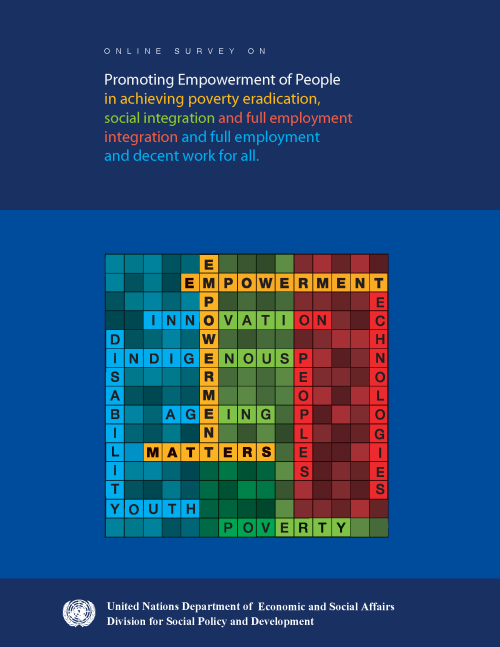
UNDESA-DSPD, from 8 August to 5 September 2012, conducted a global online survey to gather inputs for consideration by the 51st session of the Commission for Social Development (CSocD), which took place from 6 to 15 February 2013.
The survey enabled the public worldwide to respond to a set of questions that were related to the priority theme of CSocD on “Promoting empowerment of people in achieving poverty eradication, social integration and full employment and decent work for all”.
The responses collected and selected from the first question “Empowerment: What does it mean to you?” was published in a separate booklet.
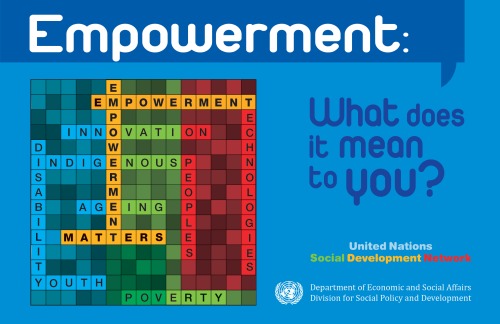
The “Definitions of Empowerment” represents a collaborative effort, made possible by the answers received from people all over the world on the Empowerment theme. Their invaluable contributions were essential for the preparation of the Empowerment Publication.
In order to collect people’s ideas and experiences, the Division for Social Policy and Development (DSPD) of UNDESA launched an on-line survey on “Promoting Empowerment of People”.
We were glad to receive tens and tens of responses from young individuals, persons with disabilities, older persons, and people working for various institutions and organizations committed to social development issues. Their keen interest…
The report presents the yearly assessment of global progress towards the MDGs, highlighting several milestones – three important MDG targets have been met well ahead of the target date of 2015. The report says that meeting the remaining targets, while challenging, remain possible – but only if Governments do not waiver from their commitments made over a decade ago.
Based on a master set of data compiled by the Inter-Agency and Expert Group on MDG indicators led by DESA’s Statistics Division, the 2012 report outlines gains in poverty reduction and access to safe drinking water, and an improvement in the lives of slums dwellers in urban areas. The report also highlights important…
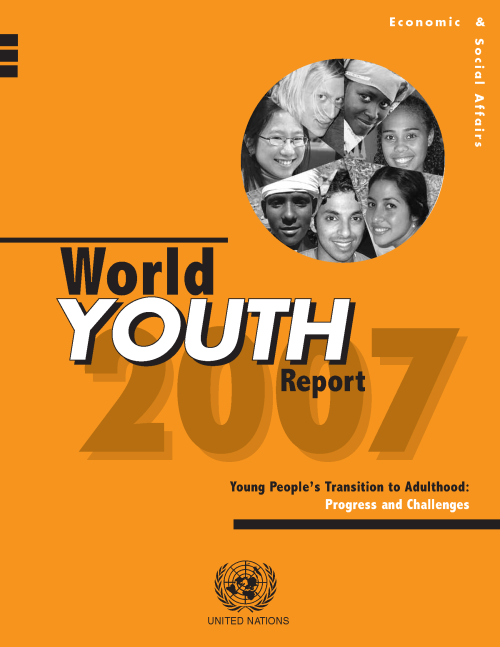
The World Youth Report 2007 examines the challenges and opportunities existing for the roughly 1.2 billion young people between the ages of 15 and 24 in the world. Distinct from the 2003 and 2005 editions, it provides a regional overview summarizing the major youth development trends in the fifteen priority areas of the World Programme of Action for Youth.
The report explores major issues of concern to youth development, including employment, education, health, poverty and violence. At the same time, it highlights youth as a positive force for development and provides recommendations for supporting their essential contributions.
“The social, economic and political costs of a prolonged youth unemployment crisis are high. It is therefore obvious that there is an urgency in addressing the youth employment crisis, but youth employment cannot be tackled without the involvement and participation of youth. It is with this in mind that the current World Youth Report is dedicated to the voices of young people themselves,” said Ms. Daniela Bas, Director of UN DESA’s Division for Social Policy and Development at today’s launch.
The Demographic Yearbook 2009-2010 is the sixty-first in a series published by the United Nations since 1948. It contains tables including a world summary of selected demographic statistics, statistics on the size, distribution and trends in national populations, fertility, foetal mortality, infant and maternal mortality, general mortality, nuptiality and divorce. Data are shown by urban/rural residence, as available. In addition, the volume provides Technical Notes, a synoptic table, a historical index and a listing of the issues of the Demographic Yearbook published to date.
Released in December 2011, the report Disability and the Millennium Development Goals: A Review of the MDG Process and Strategies for Inclusion of Disability Issues in Millennium Development Goal Efforts, examines the MDGs and its relation to disability issues with a view to impact the post-2015 development agenda. It is intended to provide a “road map” for how and why disability can and should be included in the planning, monitoring and evaluation of MDG-related programmes and policies.

The report focuses on the social and economic wellbeing of older persons and documents the demographics of older age; their economic status and participation in the labour force; the health of older persons; and the societal perceptions and social integration of older persons. On each of these topics, the report attempts to account for the diversity of situations of older persons in society and across the world. It also attempts to capture the changing reality and perceptions of old age as well old persons’ own views.
The report is based on recent research and empirical data from various sources available to the United Nations Secretariat, and includes a range of up-to-…
The number of deaths of children under the age of five declined from 12.4 million in 1990 to 8.1 million in 2009, which means nearly 12,000 fewer children die each day. Some of the world’s poorest countries have also made impressive gains in the fight against poverty, but the least developed countries still lag in efforts to improve living standards.
“The economic crisis reminds us that it is essential for people to be healthy, educated, adequately housed and well fed to be more productive and better able to contribute to society,” said Jomo Kwame Sundaram, DESA’s Assistant Secretary-General for Economic Development. “Social policy should be an integral part of economic policy.”
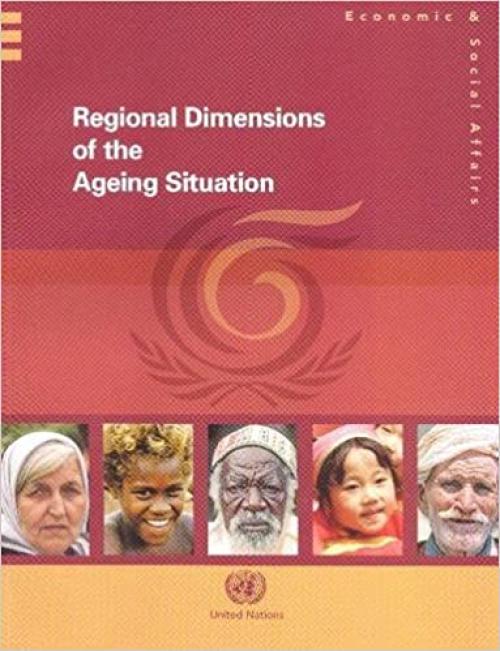
This Publication contributes to the series of events, conferences and publications related to the first review and appraisal of the Madrid International Plan of Action on Ageing. It highlights priorities, as well as recent trends and policy developments, in the five UN regions of the world.
The publication, which is a joint effort of UN staff and international experts, aims to assist national governments, the international community and the public at large to better assess the situation of older persons five years after the Second World Assembly on Ageing. It should better inform the debate on how to align priorities, policy innovations and technical cooperation to implement the…
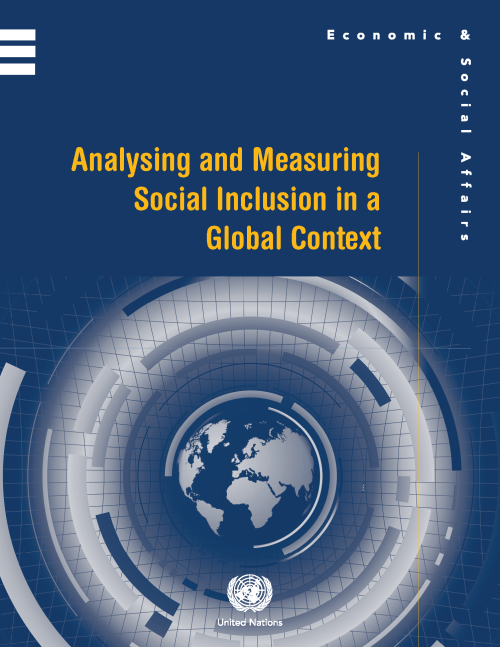
The objective of the study is to serve as a guiding framework for policymakers, researchers and practitioners interested in developing practical tools for evidence-based policymaking, impact assessment, monitoring and evaluation in the area of social inclusion. It provides guidance on how to develop tools, taking into consideration the historical, cultural and contextual backgrounds of one’s own society.
The study also builds on the work on social indicators that has already been undertaken by many people at local, national, regional and international levels. It is hoped that the study will help to inspire new ideas and to generate innovative…
 Welcome to the United Nations
Welcome to the United Nations